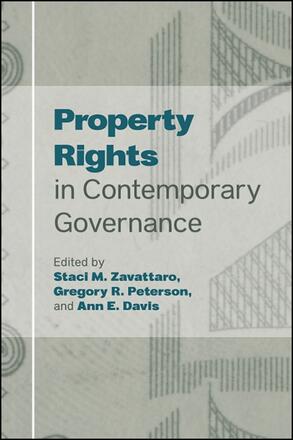
Property Rights in Contemporary Governance
Alternative formats available from:
Examines how our diverse understandings of property impact real-world governing strategies.
Description
Property is a concept that is seemingly simple to understand yet continually evolving in the face of cultural change and technological advance. Property Rights in Contemporary Governance examines the many meanings of property, how they have changed over time, and the roles they play in policy, society, and law. With its deeply interdisciplinary approach, the book offers perspectives from economics, environmental studies, history, law, philosophy, public administration, and public policy. The contributors discuss such topics as the origin of the corporation, the role of the takings law, the development of legal protections for financial instruments in nineteenth-century France, the impact of climate change, the shifts in philosophical conceptions of property required by advances in intellectual property rights, and the influence of new technologies, including drones. This is a comprehensive and thoughtful exploration of how our diverse understandings of property impact real-world governing strategies.
Staci M. Zavattaro is Associate Professor of Public Administration at the University of Central Florida. Her books include Cities for Sale: Municipalities as Public Relations and Marketing Firms, also published by SUNY Press. Gregory R. Peterson is Professor of Philosophy and Religion at South Dakota State University. He is the author of Minding God: Theology and the Cognitive Sciences. Ann E. Davis is Associate Professor of Economics at Marist College. She is the author of Money as a Social Institution: The Institutional Development of Capitalism and The Evolution of the Property Relation: Understanding Paradigms, Debates, and Prospects.
Reviews
"This book is unique in the field of property theory. First, its essays are rooted in the perspectives of many different fields. Second, the areas that it covers and the vast majority of its content are highly original. While the idea that property and governance are intimately connected is not original, the contributions that the book makes to that idea definitely are. It was fascinating and very useful reading. " — Laura S. Underkuffler, author of The Idea of Property: Its Meaning and Power